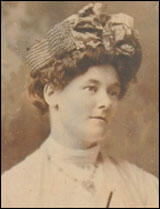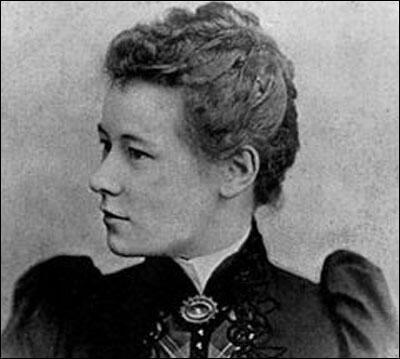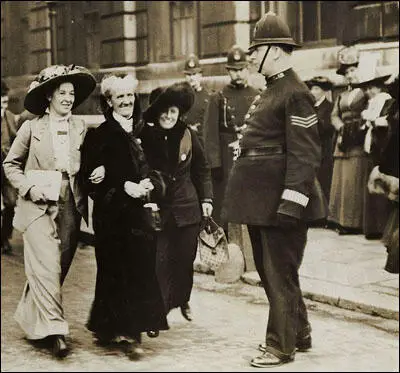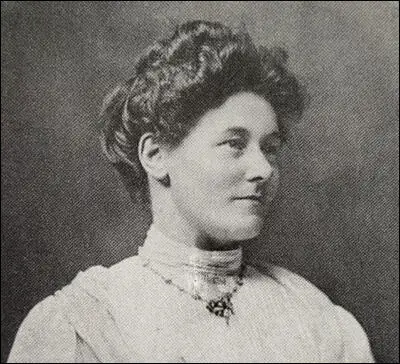Emma Sproson

Emma Lloyd, one of the seven children of John Lloyd and Ann Johnson Lloyd, was born on 13 April 1867 at Pikehelve Street, West Bromwich. Her father was a canal boat builder who drank heavily and this resulted in a childhood of extreme poverty. The family moved to Bilston in 1875. (1)
According to her biographer, Jane Martin: "Emma had little formal schooling and joined the casual labour market at the age of eight: picking coal from the pit mounds and running errands. A year later she left home to enter the household of a local milkwoman where she helped with the cooking, cleaning, and evening delivery, though she did attend school four days a week. In 1880 she obtained a full-time position that combined shop work with domestic service. Later she was dismissed without a reference when she reported that her mistress's brother had made sexual advances towards her. Now unemployed, Emma moved to Lancashire to find work. About that time she began teaching in a Sunday school and was introduced to the church debating society." (2)
On 1st August 1896, Emma married Frank Sproson, postman and secretary of the Wolverhampton branch of the Independent Labour Party. Emma Sproson now became active in socialist politics in the area. She later recalled how she became involved in the women's suffrage movement. She attended a meeting being held by George Curzon, the Conservative Party MP for Southport. He refused to answer her question because "she was a woman and did not have the vote". (3)
Emma Sproson: WSPU
On 26th October 1906, Frank Sproson invited Emmeline Pankhurst, the founder of the Women's Social and Political Union (WSPU) to address a meeting of the Wolverhampton ILP. Pankhurst stayed at the Sprosons' home and after the meeting Emma joined the WSPU. (4) Over the next few months Sproson joined forces with Jennie Baines, Mabel Capper, Minnie Baldock and Ada Nield Chew, to speak at meetings in order to recruit working-class women to the cause. (5)

On 13th February 1907 the WSPU hired Caxton Hall for what was called a "Women's Parliament,". According to Sylvia Pankhurst, the tickets for the gathering were sold out long before the day. "Almost everyone in the hall turned out for the march. Parliament was guarded by an army of police to prevent the women approaching its sacred precincts. The constables had their orders to drive them away, making as few arrests as possible. Mounted men scattered the marchers; foot police seized them by the back of the neck and rushed them along at arm's length, thumping them in the back, and bumping them with their knees in approved police fashion." (6)
Emma Sproson was one of the fifty-four women arrested. Frederick Pethick-Lawrence, stood as surety for her and she was bailed to appear before the magistrates on 14 February. From the options of a 20s. fine or fourteen days' imprisonment, she elected to go to prison. After her release she took part in another protest meeting and was arrested and sentenced to a fine or a one-month prison sentence. While in Holloway, she was visited by Christabel Pankhurst. (7)
Teresa Billington Greig found Emmeline Pankhurst a difficult colleague: "To work alongside of her day by day was to run the risk of losing yourself. She was ruthless in using the followers she gathered around her, as she was ruthless to herself. She took advantage of both their strengths and their weaknesses suffered with you and for you while she believed she was shaping you and used every device of suppression when the revolt against the shaping came. She was a most astute statesman, a skilled politician, a self-dedicated reshaper of the world - and a dictator without mercy". (8)
Women's Freedom League
Some leading members of the Women's Social and Political Union began to question the leadership of Emmeline and Christabel Pankhurst. These women objected to the way that the Pankhursts were making decisions without consulting members. They also felt that a small group of wealthy women like Emmeline Pethick-Lawrence were having too much influence over the organisation. In the autumn of 1907, Emma Sproson, Teresa Billington-Greig, Elizabeth How-Martyn, Dora Marsden, Helena Normanton, Margaret Nevinson and Charlotte Despard and seventy other members of the WSPU left to form the Women's Freedom League (WFL). (9)

Emma Sproson became a member of the national executive committee of the Women's Freedom League. Like the WSPU, the WFL was a militant organisation that was willing the break the law. As a result, over 100 of their members were sent to prison after being arrested on demonstrations or refusing to pay taxes. However, members of the WFL was a completely non-violent organisation and opposed the WSPU campaign of vandalism against private and commercial property. The WFL also attracted suffragettes who preferred to work with the Labour Party and "who regarded it as hypocritical for a movement for women'd democracy to deny democracy to its own members." (10)
In a letter to Maud Arncliffe Sennet Emma Sproson admitted that she suffered a great deal of abuse when she was campaigning for women's suffrage. "The bruises and scar of the flesh is not the worst we endure in this fearful conflict, I was addressing a large crowd on one occasion when a dirty urchin spit in my face and his expectoration passed out of his lips into mine, I collapsed and now know what had happened. I would have lost any limb I own to have escaped this experience, but more bitter still are the slights and insinuations of those whose sympathy ought to encourage our hopes and strengthen our backs for the conflict. But what ever happens the same motive which stimulated me for the conflict will inspire me to the end. Namely I have a daughter and I can only fulfil my duty to my girl and society by breaking down the fetters of the girls of the future which have bound us down in the past." (11)
It was WFL policy of "no taxation without representation" meant that in 1911 Emma Sproson served two terms of imprisonment in Stafford gaol for the offence of keeping a dog without a licence. Frank Sproson wrote in The Vote: "The humiliating position of the married woman, especially the working woman, is admitted by all Suffragists; but I never realised that she was such an abject slave so clearly as when I stood in the Wolverhampton Police Court, side by side with my wife, charged with aiding and abetting her to keep a dog without a license. The only evidence submitted by the prosecution (the police) that I actually did anything was that I presided at two meetings in support of the "No Vote, No Tax" policy of the Women's Freedom League. That I said anything that was not fair comment on the general policy of militancy there was no evidence to show; if, then, on this point I was liable, then all supporters of militancy are equally so. But I do not believe it was on this evidence that I was convicted. No. The dog was at my house, and cared for by my children during my wife's absence. In the eyes of the law, I was lord and master, so that my offence, therefore, was not that I did anything, but rather that I did not do anything." (12)

In 1912 Emma Sproson found herself in dispute with Charlotte Despard who she believed had developed an autocratic style of leadership. As a result she left the Women's Freedom League and devoted herself to local politics. Sproson contested two unsuccessful local elections on behalf of the Labour Party in 1919 and 1920, but in 1921 she was elected councillor for Dunstall ward. On receiving the news of victory she waved a red flag from the Town Hall balcony earning the nickname "Red Emma". (13)
Labour Councillor
The first woman councillor in Wolverhampton, she served on the public health committee and the subcommittees that dealt with mental health and homes for unmarried mothers. In the autumn of 1922 she attempted to expose financial irregularities in the administration of the local fever hospital. (14) She argued that "fellow councillors were charging £5 expenses for a trip to London which she said only cost her 30 shillings". (15) The official report exonerated the officials involved and Emma was censured by the Labour Party. In retaliation she published her own version of events in a pamphlet entitled "Fever Hospital Inquiry - Facts v. Fairy Tales". (16)
Emma remained active in the Independent Labour Party until her death at her home, 56 Castlecroft Road, Tettenhall, Staffordshire, on 22nd December 1936.
Primary Sources
(1) Emma Sproson, letter to Maud Arncliffe Sennett (8th May 1909)
The bruises and scar of the flesh is not the worst we endure in this fearful conflict, I was addressing a large crowd on one occasion when a dirty urchin spit in my face and his expectoration passed out of his lips into mine, I collapsed and now know what had happened. I would have lost any limb I own to have escaped this experience, but more bitter still are the slights and insinuations of those whose sympathy ought to encourage our hopes and strengthen our backs for the conflict. But what ever happens the same motive which stimulated me for the conflict will inspire me to the end. Namely I have a daughter and I can only fulfil my duty to my girl and society by breaking down the fetters of the girls of the future which have bound us down in the past.
(2) Frank Sproson, The Vote (8th July, 1911)
The position in Wolverhampton in regard to tax resistance is certainly of interest to the supporters of militancy.
We do meet occasionally in the Suffrage movement, the woman with the pitiful tale: I should like to help you, but I dare not; my husband is against me. But it is, indeed, a revelation to meet an enthusiastic supporter with an equally sympathetic husband, who finds herself hampered, through the decisions of magistrates who hold the husband liable for the deeds of his wife.
Ever since I began to take a serious interest in politics I have believed in sex equality, and have never denied my wife the freedom that I myself claim, and, as I shall endeavour to show, it [is] because of this that I was convicted.
The humiliating position of the married woman, especially the working woman, is admitted by all Suffragists; but I never realised that she was such an abject slave so clearly as when I stood in the Wolverhampton Police Court, side by side with my wife, charged with aiding and abetting her to keep a dog without a license. The only evidence submitted by the prosecution (the police) that I actually did anything was that I presided at two meetings in support of the "No Vote, No Tax" policy of the Women's Freedom League. That I said anything that was not fair comment on the general policy of militancy there was no evidence to show; if, then, on this point I was liable, then all supporters of militancy are equally so. But I do not believe it was on this evidence that I was convicted. No. The dog was at my house, and cared for by my children during my wife's absence. In the eyes of the law, I was lord and master, so that my offence, therefore, was not that I did anything, but rather that I did not do anything.
I did not assert my authority, I did not force my wife into subjection, and however legal the magistrate's decision may have been, it certainly was not just.
It was the spirit of rebellion against injustice displayed by Mrs. Emma Sproson that first won for her my admiration. This admiration is far too deep rooted to be suppressed by the decision of magistrates.
I admire the rebel against injustice, man or woman, because I know that it is to them that all real progress is due. A friend once said to me, when criticising my wife, "But what would happen if all other women did as she is doing?" I replied: "They would get the vote to-morrow"; and he saw it. The pity is that others do not.

